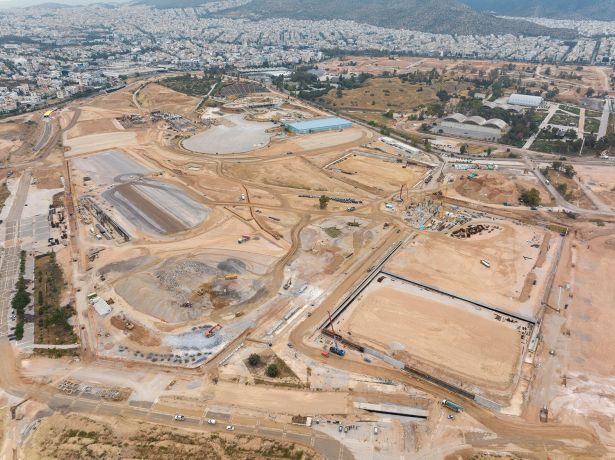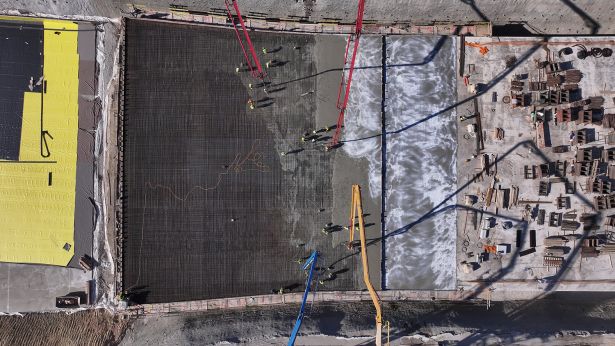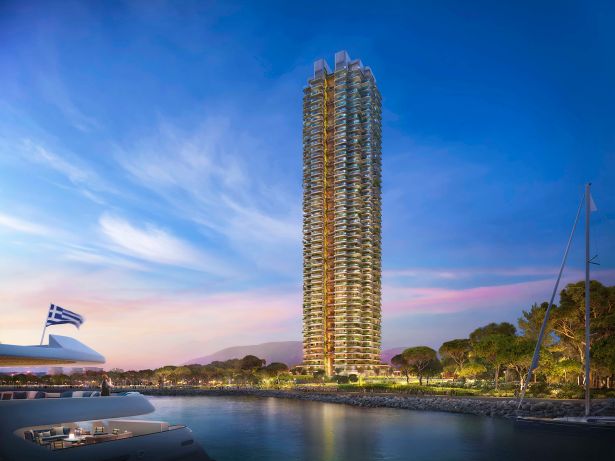Greece’s Construction Comeback Might Be a Model for Other Countries
From a 1,500-acre redevelopment of a former airport to hotels on the Greek islands, the country's commercial real estate is booming after several lean years
By Nicholas Rizzi July 31, 2024 6:00 am
reprints
The Ellinikon airport just outside Athens once welcomed thousands of visitors into the ancient Greek capital until 2001, when it was decommissioned in favor of the Athens International Airport.
Ellinikon was later used for the 2004 Olympic Games, but the massive site, nearly four miles away from Athens’ city center, has mainly sat empty since.
That is changing. The change underscores the impact an improving national economy overall can have on a country’s commercial real estate market — something those working in the industry in the U.S. should note — and offers hope that CRE can still be big business in unlikely locales.
Greek firm Lamda Development has embarked on an $8.45 billion project to transform the nearly 1,500-acre lot into a city within a city with office space, two malls, a casino, hotels, schools, gyms, medical facilities and a nearly 495-acre park (bringing green space to a region not exactly known for any).
The Ellinikon project will also consist of about more than 8,000 housing units, 170 of which will be in the country’s first skyscraper, the 650-foot-tall Riviera Tower designed by Foster + Partners on a waterfront portion of the site. (Central Athens has not been able to build as high as other cities due to a local ordinance forbidding heights to surpass the Parthenon’s.)
While the site currently looks mainly like a dirt pit — with some graffiti-covered former airport buildings scattered throughout — looks can be deceiving. Portions of the site teem with construction crews — even toiling away during a heat wave — gearing for the Ellinikon’s first phase, set to come online in 2026.
“In just two years from now, this is going to be like a world,” Odisseas Athanasiou, CEO of Lamda, said during a press conference at the Ellinikon in June. “Then you will see why we call it such a rewarding process.”

The Ellinikon might be the largest construction site in Greece — it’s about twice the size of Central Park in a country that itself is roughly the size of Alabama with about 10.3 million people — but it’s far from the only one.
After a period of relative quiet for construction as Greece pulled itself out of near bankruptcy during the 2008 debt crisis, the country has been hit with a lightning bolt of development with residential, office, hotels, green infrastructure and more taking shape all over the country.
“We’re coming out of a dry spell and all of sudden there’s water,” said Yannis Perrotis, the head of Greek CBRE affiliate Atria Group. “We are kind of catching up during this period.”
Aside from the Ellinikon, there’s the nearly 620,000-square-foot The Grid office development in Athens, the recently renovated 22-story Piraeus Tower office building in Piraeus, The Ilisian hotel/residential/retail project in Athens, and Grivalia Hospitality’s Six Senses resort on the secluded Petalioi island of Megalonisos.
“The product was nonexistent in Greece. We have very few cases of luxury hotels,” said Grivalia’s investment manager Thodoris Derziotis. “There wasn’t a market. You had to create one.”
This wave of activity has been a huge boon for the country’s construction industry. It’s seen an 84 percent growth in production value since 2017, reaching about $14 billion in 2023, according to a report by the Foundation for Economic and Industrial Research.
It’s not just the construction industry that’s doing well, as Greece’s entire economy is in a much different place than it was in 2008. The country’s gross domestic product (GDP) is expected to grow by nearly 3 percent this year, surpassing the average of 0.8 percent growth in the rest of Europe and getting closer to Greece’s pre-crisis level of GDP, Reuters reported.
“The fiscal situation has improved a lot so GDP is growing relatively fast, and this is good news,” said Manos Matsaganis, a professor of public finance at the Polytechnic University of Milan and the head of the Greek and European Economy Observatory at the Hellenic Foundation for European and Foreign Policy. “Also, unemployment is falling. This is all obviously very good news.”
Greece faced the same challenges as the rest of the world — COVID-19 and rising inflation — but that hasn’t really paused the country’s real estate recovery that much, since Greece’s market was basically frozen for years.
“Simply, we were in a recession for 10 years and there were not any development plans,” said Nicky Simbouras, the founder and managing director of Cushman & Wakefield’s Greece affiliate CWProprius. “The sentiment was very bad. There was not any activity in general.”
Because of that, Greece has had a pent-up demand for housing and office space — especially since most of what’s currently on the market has long been outdated — and a real estate industry scrambling to build enough to meet it.

Last year, tenants leased 1.7 million square feet of office space in Greece, a 22 percent increase compared to 2022 and just 12 percent below the highest level since before the 2008 debt crisis, according to a C&W report. Much of that activity has come from tenants renewing their spaces, Simbouras said.
On the investment side, about $180 million of office properties changed hands in 2023, 15 percent higher than the previous year.
“Due to the recession and the lack of stock we are not in the same position as other markets,” Simbouras said. “We are in a better position.”
In the first quarter of 2024, the latest period for which numbers are available, about 322,917 square feet have been leased and $62 million sold, according to C&W. While both those numbers were down year-over-year, C&W expects office sales to increase in the second half of the year.
For the residential market, home prices in the country’s capital have been blowing the roof off what’s left of the Parthenon’s. Prices in Athens climbed 12.2 percent in October 2023, outpacing the rest of Europe and becoming one of the most expensive markets on the continent, Bloomberg reported. Part of that is because of the lack of supply for housing, leading many Greek people to rent rather than buy a home, which Perrotis said had traditionally been “something that was very close to the heart of the Greek people.”
“[Renting] has started becoming normalized,” Perrotis said. “We had a scarcity, we had very strong demand and a very limited supply, creating high values.”
All that high demand for housing is something Lamda is looking to capitalize on with its Ellinikon project.
Lamda wants to create a 15-minute city in the development — where shops, offices, homes and, of course, the beach are within 15 minutes’ walk — and is offering plenty of housing to lure people there.
The company has set aside nearly 300 acres of the project for a multitude of residential developments, including the Riviera Tower, beachfront villas and several scattered condominium buildings. Lamda said it wants to offer a range of pricing at the development, with some starting at $5,419 per square meter and the average going for $10,853 per square meter.

Demand has already been strong for the 1,500 apartments set to come online in the first phase. Even with only a few floors of the Riviera Tower built and the rest of the housing still not online, Lamda has sold about 65 percent of the first phase units, mainly to Greek buyers or Greek expats looking to return home.
Those sales are a boon to Lamda’s bottom line — it already has an earning before interest, taxes, depreciation and amortization of about $17 million on the Ellinikon project — and helped it cover the nearly $3.6 billion it needs to build its first phase. Presales totaled about $1.2 billion so far, and Lamda is covering the rest with about $716 million from a capital raise in 2019 and almost $600 million in bonds, according to the company.
And its earnings are also expected to help Greece as a whole, as Lamda estimated Ellinikon will eventually contribute about 2.5 percent to Greece’s total GDP.
One of the reasons Lamda CEO Athanasiou said the company has been able to have such strong progress on the Ellinikon — which it has been planning since 2014 — is that previous austerity measures and a pro-business government in the country have markedly changed the landscape for developers.
“Timing, for the first time in the last two decades, is in our favor,” Athanasiou said. “We had the pandemic, we had the crisis. … Things weren’t exactly on our side, but now things have improved.
“This is probably the most pro-business government I have ever experienced in my life,” Athanasiou added.
That’s something the government — led almost uninterrupted since 2019 by Prime Minister (and Harvard Business School-trained ex-banker) Kyriakos Mitsotakis — has been really striving to keep going with its own economic development agency, Enterprise Greece, set up to attract foreign investors and help local companies get their wares out to the rest of the world.
“We’re talking about digitalization, we’re talking about cutting of red tape, we’re talking about different incentives for investments and a restructuring of how the government operates,” Enterprise Greece CEO Marinos Giannopoulos previously told Commercial Observer. “Of course, there are things to be done, but the main thing is that part of that success is the stability and what the government has achieved for the second term running.”
One of the reasons Greece was able to turn the tide was by simply getting accurate economic data on how different sectors are doing, something that was lacking in the pre-2008-crisis era in the country, said Brett House, a professor of economics at Columbia University.
“It’s impossible to treat the patient unless you have clear metrics,” House said, adding that there’s still a shadow economy in Greece hiding the full picture. “It’s very hard to see if the economy works as well as it could for people unless you have accurate numbers. That was a challenge that has been addressed.”
And the rest of the world has taken notice too, with DBRS Morningstar giving the country an investment-grade rating last year, The New York Times reported. Giannopoulos said that has led major companies like Microsoft, Google and Amazon to invest in projects around the country.
“We’re actually becoming a digital hub,” Giannopoulos previously said. “It’s a big thing to have all the three big players coming to Greece, and there’s always a bigger push for more companies to come and join the club.”
This positive perception of Greece hasn’t helped it lure just more foreign investors, but also more foreign visitors.
The number of tourists — a major driver of the country’s economy — dropped 6.4 percent from 2008 to 2009, while revenue per available hotel room fell 14.6 percent during that same time, according to hospitality tracker STR.
“Greece was viewed, unfortunately, in a very negative light because of the bad publicity because of the crisis,” Atria’s Perrotis said. “The story has changed, and the change of the story has attracted more visitors.”
A report from the Bank of Greece found that more than 32 million tourists descended upon Greece in 2023 and contributed about $22 million to its economy, with travel receipts 15.7 percent higher than in 2022.
And that has led to more and more hotels getting off the ground. A report by Travelworks found that more than 60 hospitality projects were recently announced, 40 percent of them operated by international companies and the rest Greece-based companies.
Grivalia is responsible for a few of those. The company has been part of the Greek real estate market for decades but decided to focus solely on the hospitality industry since then. It has at least nine projects under its belt, including the under-construction Six Senses project on Megalonisos island and the recently opened luxury camping resort in Voula, close to Athens, called 91 Athens Riviera.
“Athens in the past decade used to have an unexplained negligence of the whole beach area, which didn’t really make sense,” Grivalia’s Derziotis said. “You couldn’t get access to the beach, it was kind of underdeveloped. So a lot of the transformation of the city right now is happening on the beachfront and on the southern suburbs of Athens.”
The transformation Derziotis mentioned also included the Ellinikon project, which has about a kilometer of beaches on the site.
Still, all of this development happening in a short amount of time means plenty of competition, not just for tourists and residents, but also for labor and materials. “Everyone is looking for workers,” Derziotis said. “Greece is a very shallow market. The human resources that are available are limited.”
And it’s not just manual labor that’s hard to come by. Derziotis said being able to hire architects and site managers has been difficult with so much demand for their skills. “We see, very often, they have too many projects that they are involved with, so they don’t have the capacity to work with you,” he said.
While firms like Grivalia and Ellinikon have gone outside Greece’s borders to find partners, Derziotis said developers still often need a local partner to be able to navigate restrictions. That’s especially true in Greece, where it’s not uncommon to stumble upon ruins dating back to antiquity when getting a site ready for construction (something Lamda had to contend with at the Ellinikon). Such discoveries can slow a project.
Plus, Greece’s economy isn’t completely out of the woods. The country suffered from a large brain drain after the economic crisis and it still hasn’t been able to completely reverse that, as there are still not a lot of high-paying jobs from big companies available (even as giants like Amazon and Microsoft increase their presence).
“All of my nephews finished their MBAs and they are now working for big companies in the U.S. and the U.K.,” CWProprius’ Simbouras said. “They are now building their careers, while in Greece it’s difficult. The size of the companies are very small compared to other countries, especially if you go to higher positions.”
The country’s employment still relies heavily on tourism-related jobs, as well as jobs in the construction industry. Salaries in both categories are “not enough … on a permanent basis to produce wealth,” the economist Matsaganis said.
“There is a lot of resentment among young, urban Greeks who feel squeezed out,” Matsaganis added. “On one hand in the labor market, low-wage jobs with not great prospects. … On the other hand, rent is going up beyond the reach of most young workers.”
Lamda said it has tried to price units in the Ellinikon development for a range of different buyers, and Athanasiou said a lot of it is still cheaper than properties in the rest of Europe. Despite that, the prices have led some locals to complain that it will become a mini-city just for the wealthy.
“This is a playground for the uber rich, which the average Greek will not be able to enjoy,” one Athens local told the U.K.’s Daily Mail earlier this year.
Athanasiou, for his part, said Lamda has held dozens of public meetings with residents about the project and the response has been overwhelmingly positive, even if they were a little unsure the project would actually get off the ground.
“For the first year, they said, ‘You’re not going to do the development. You’re just announcing you’re going to do the development,’ ” Athanasiou said.
But with development happening in seemingly every corner of the country, it’s no longer a question of if, but when, these projects open. What’s important to most Greeks — both inside and outside the real estate industry — is that in the process the country doesn’t lose what makes it beautiful, especially on its 12 major islands.
“There is concern that this excessive investment in real estate in the island may be short-lived in view of global warming, geopolitical tensions and contribute to undermining the natural environment which tourism relies on,” Matsaganis said. “People want to come to the Greek islands because apparently they are beautiful and unique, but in the process they become paved over.”



